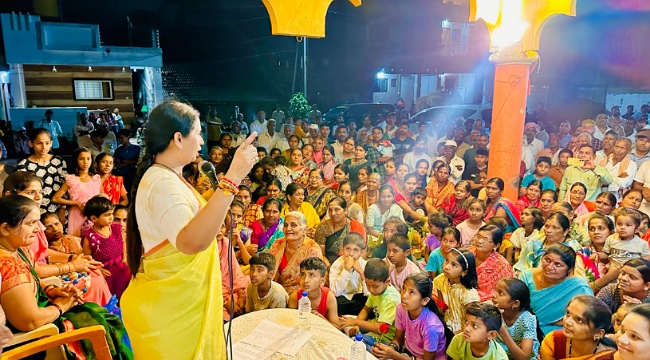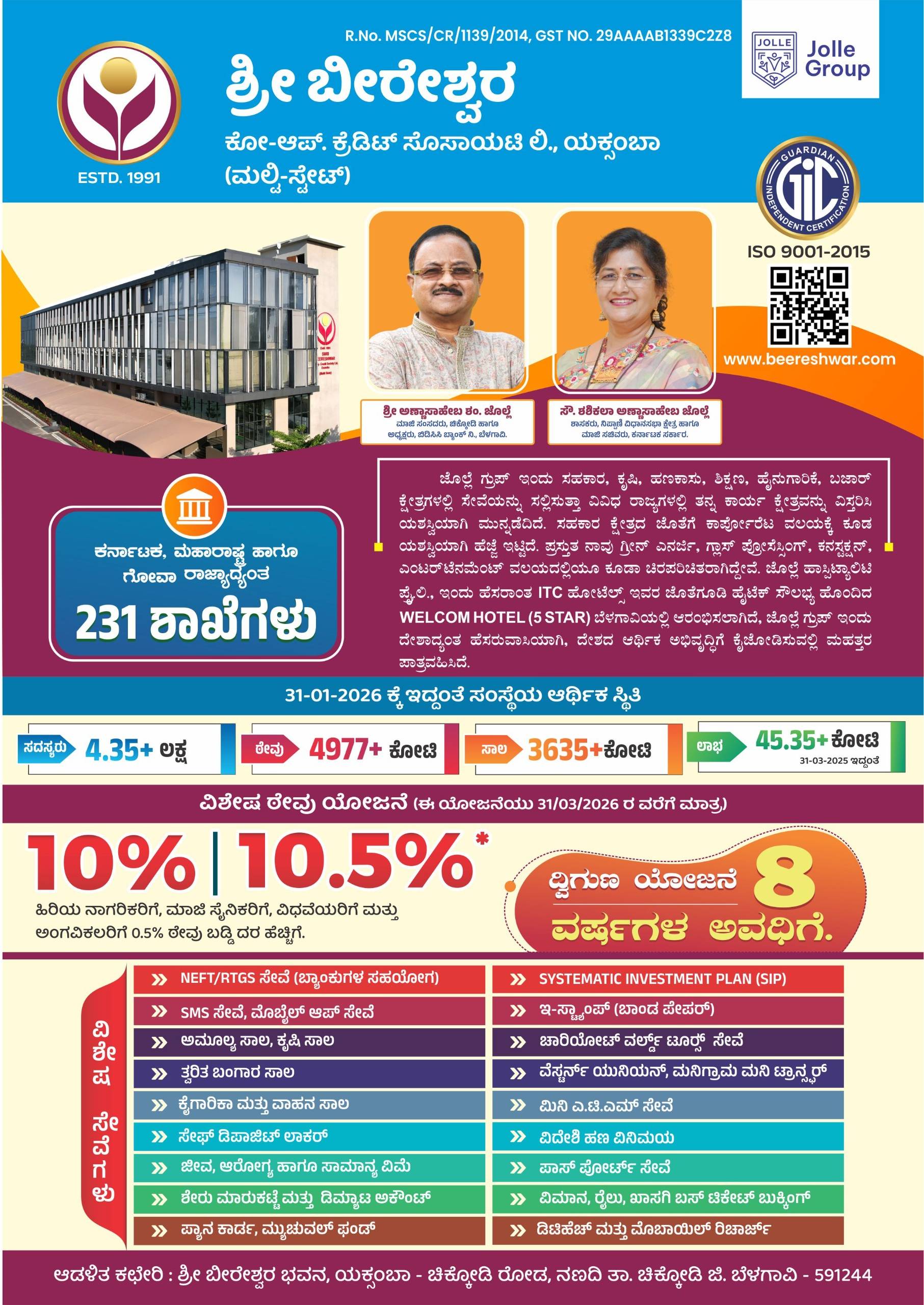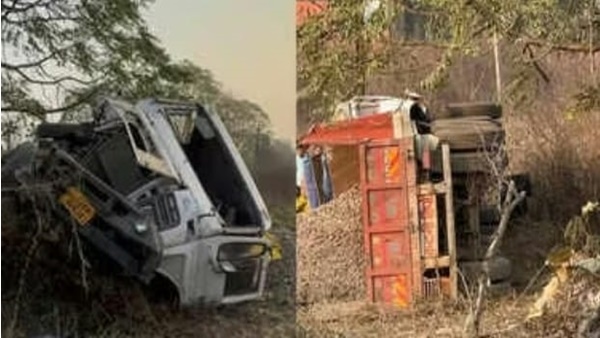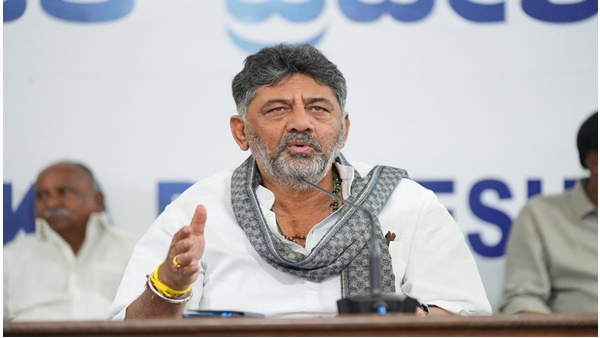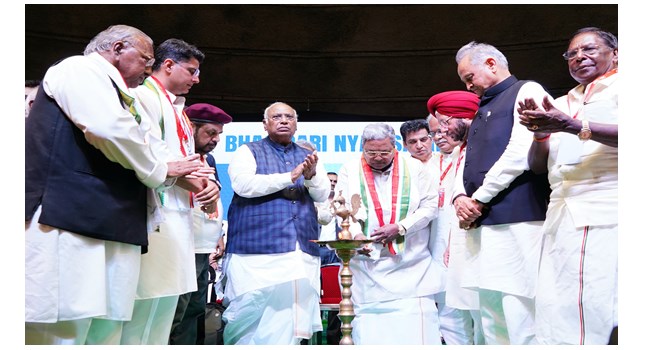
ಪ್ರಗತಿವಾಹಿನಿ ಸುದ್ದಿ: ಈ ಭಾಗಿದಾರಿ ನ್ಯಾಯ ಸಮ್ಮೇಳನದಲ್ಲಿ ಭಾಗಿಯಾಗುತ್ತಿರುವುದು ನನಗೆ ಸಂತಸ ತಂದಿದೆ . ಈ ಸಮ್ಮೇಳನವು ನ್ಯಾಯ ಮತ್ತು ಸಮಾನತೆಗಾಗಿ ನಾವು ಮಾಡಿಕೊಂಡಿರುವ ಸಂಕಲ್ಪದ ಸಂಕೇತವಾಗಿದೆ ಎಂದು ಮುಖ್ಯಮಂತ್ರಿ ಸಿದ್ದರಾಮಯ್ಯ ತಿಳಿಸಿದ್ದಾರೆ.
ಭಾಗೀದಾರ್ ನ್ಯಾಯ್ ಸಮ್ಮೇಳನದಲ್ಲಿ ಮುಖ್ಯಮಂತ್ರಿ ಸಿದ್ದರಾಮಯ್ಯ ಭಾಷದ ಹೈಲೈಟ್ಸ್:
ಇದು ಕೇವಲ ರಾಜಕೀಯ ಸಭೆಯಲ್ಲ. ಇದು ಭಾರತದ ಹಿಂದುಳಿದ ಮತ್ತು ಅಂಚಿನಲ್ಲಿರುವ ಸಮುದಾಯಗಳ ಘನತೆ, ಭಾಗವಹಿಸುವಿಕೆ ಮತ್ತು ನ್ಯಾಯಯುತ ಪ್ರಾತಿನಿಧ್ಯಕ್ಕಾಗಿ ಮಾಡಿರುವ ಎಚ್ಚರಿಕೆಯ ಮತ್ತು ಒಗ್ಗಟ್ಟಿನ ಕರೆಯಾಗಿದೆ.
ಡಾ. ಅಂಬೇಡ್ಕರ್ ಹೇಳಿದಂತೆ, “ನ್ಯಾಯವು ರಾಷ್ಟ್ರದ ಆತ್ಮವಾಗಿದೆ.” ಇಂದು ಆ ಆತ್ಮವು ತಾರತಮ್ಯ ಮತ್ತು ಅಸಮಾನತೆಯ ವಿರುದ್ಧ ಕೂಗುತ್ತಿದೆ. ಈ ಸಮ್ಮೇಳನವು ನಮ್ಮ ಉತ್ತರವಾಗಿರುವುದಲ್ಲದೇ , ಎಲ್ಲ ಜಾತಿ-ವರ್ಗದವರಿಗೂ ಸಮಾನ ಭಾಗವಹಿಸುವಿಕೆಯ ಸ್ಥಾನ ಸಿಗುವವರೆಗೆ ನಾವು ವಿಶ್ರಾಂತಿ ಪಡೆಯುವುದಿಲ್ಲ ಎಂಬ ಪ್ರತಿಜ್ಞೆಯೂ ಹೌದು.
ಮಹಾತ್ಮ ಗಾಂಧೀಜೀಯವರಿಂದ ಹಿಡಿದು ರಾಹುಲ್ ಗಾಂಧಿಯವರಿಗೆ ಕಾಂಗ್ರೆಸ್ ಪಕ್ಷವು ಯಾವಾಗಲೂ ಶೋಷಿತರ ಪರವಾಗಿ ನಿಂತಿದೆ. ನ್ಯಾಯವು ಕೇವಲ ಘೋಷಣೆಯಲ್ಲ, ಇದು ಸಂವಿಧಾನದ ಭರವಸೆಯಾಗಿದೆ. ಮತ್ತು ಭಾಗಿದಾರಿಯು ಜನತಂತ್ರದ ಜೀವನಾಡಿಯಾಗಿದೆ.
ಸಾಮಾಜಿಕ ನ್ಯಾಯಕ್ಕಾಗಿ ರಾಹುಲ್ ಗಾಂಧಿಯವರು ಧೈರ್ಯ, ಸ್ಪಷ್ಟತೆ ಮತ್ತು ಸಹಾನುಭೂತಿಯಿಂದ ನಾಯಕತ್ವ ವಹಿಸಿದ್ದಕ್ಕಾಗಿ ನಾನು ಅವರಿಗೆ ಹೃತ್ಪೂರ್ವಕ ಧನ್ಯವಾದಗಳನ್ನು ಅರ್ಪಿಸುತ್ತೇನೆ. ಇಂದಿನ ಭಾರತದಲ್ಲಿ, ಶ್ರೀ ರಾಹುಲ್ ಗಾಂಧಿಯವರು ಮತ್ತು ಕಾಂಗ್ರೆಸ್ ಪಕ್ಷವು ಮಾತ್ರ ಹಿಂದುಳಿದ ವರ್ಗಗಳಿಗೆ ಮತ್ತು ಎಲ್ಲಾ ಅಂಚಿನಲ್ಲಿರುವವರಿಗೆ ನ್ಯಾಯ ನೀಡಲು ನೈತಿಕ ಬದ್ಧತೆ ಮತ್ತು ರಾಜಕೀಯ ಇಚ್ಛಾಶಕ್ತಿಯನ್ನು ಹೊಂದಿದೆ.
ಇದೊಂದು ಹೊಸ ಅಧ್ಯಾಯದ ಆರಂಭವಾಗಿರಲಿ. ಶೋಷಿತರು ಒಗ್ಗೂಡಿದಾಗ, ಇತಿಹಾಸವು ನ್ಯಾಯದ ಕಡೆಗೆ ಬಾಗುತ್ತದೆ. ನಾವು ಒಟ್ಟಾಗಿ ಸಂಘಟಿತರಾದಾಗ, ನಾವು ಕೇವಲ ನಮ್ಮ ಹಕ್ಕುಗಳಿಗಾಗಿ ಹೋರಾಡುವುದಿಲ್ಲ, ಭಾರತದ ಆತ್ಮಕ್ಕಾಗಿ ಹೋರಾಡುತ್ತೇವೆ.
ಆದರೆ ಈ ಸಮ್ಮೇಳನ ಏಕೆ ಅಗತ್ಯವೆಂದು ತಿಳಿಯಲು, ಶತಮಾನಗಳಿಂದ ಸಮಾನತೆಯನ್ನು ನಿರಾಕರಿಸಿದ ಸಾಮಾಜಿಕ ರಚನೆಗಳನ್ನು ನಾವು ಪರಿಶೀಲಿಸಬೇಕು. BJP-RSS ಸಂಸ್ಥೆಯು ಈ ಅನ್ಯಾಯವನ್ನು ಹೊಸ ರೂಪಗಳಲ್ಲಿ ಎಡೆಬಿಡದೆ ಬಲಪಡಿಸುತ್ತಿರುವುದನ್ನು ಎದುರಿಸಬೇಕು.
ಅದೃಶ್ಯ ಕೈಗಳು, ಕೇಳದ ಧ್ವನಿಗಳು: ಭಾರತದ ಸಾಮಾಜಿಕ ರಚನೆಯ ಸತ್ಯ
ನ್ಯಾಯದ ತುರ್ತು ಅಗತ್ಯವನ್ನು ಅರ್ಥಮಾಡಿಕೊಳ್ಳಲು, ನಾವು ಕಹಿ ಸತ್ಯವನ್ನು ಎದುರಿಸಬೇಕು: ಭಾರತದ ಸಾಮಾಜಿಕ ವ್ಯವಸ್ಥೆಯು ನ್ಯಾಯದ ಮೇಲೆ ನಿರ್ಮಿತವಾಗಿಲ್ಲ, ಬದಲಿಗೆ ತಾರತಮ್ಯದ ಮೇಲೆ ನಿರ್ಮಿತವಾಗಿದೆ.
ಈ ರಾಷ್ಟ್ರವನ್ನು ತಮ್ಮ ಶ್ರಮದಿಂದ ನಿರ್ಮಿಸಿದ ಉತ್ಪಾದಕ ವರ್ಗ, ಅವರಲ್ಲಿ ಹೆಚ್ಚಿನವರು ಹಿಂದುಳಿದ ವರ್ಗಗಳಿಂದ ಬಂದವರು, ಕಲಿಕೆ, ಭೂಮಿ ಮತ್ತು ನಾಯಕತ್ವದಿಂದ ವಂಚಿತರಾದರು. ಪಶುಗಳನ್ನು ಸಾಕಿದ, ವಸ್ತುಗಳನ್ನು ತಯಾರಿಸಿದ, ಬೇಸಾಯ ಮಾಡಿದ ಮತ್ತು ಸಮಾಜವನ್ನು ಸುಸ್ಥಿರಗೊಳಿಸಿದ ಕೈಗಳನ್ನು ಜನ್ಮದಿಂದಲೇ ಸಂಕೋಲೆಗೆ ಒಡ್ಡಲಾಯಿತು. ಕಲ್ಪನೆ ಮಾಡಬಹುದಾದ, ಆಡಳಿತ ನಡೆಸಬಹುದಾದ ಮತ್ತು ನಾಯಕತ್ವ ವಹಿಸಬಹುದಾದ ಮನಸ್ಸುಗಳನ್ನು ಶಾಲೆಗಳಿಂದ, ಧರ್ಮಗ್ರಂಥಗಳಿಂದ ಮತ್ತು ಅಧಿಕಾರದ ಸ್ಥಾನಗಳಿಂದ ಹೊರಗಿಡಲಾಯಿತು.
ಇದು ಆಕಸ್ಮಿಕವೇನಲ್ಲ. ಸಂಗ್ರಾಹಕ ವರ್ಗವು ಜ್ಞಾನ, ಸಂಪತ್ತು ಮತ್ತು ಸವಲತ್ತುಗಳ ಮೇಲಿನ ತಮ್ಮ ಹಿಡಿತವನ್ನು ಉಳಿಸಿಕೊಂಡು, ಮಾನವೀಯತೆಯಿಲ್ಲದ ಮನುಸ್ಮೃತಿಯ ತತ್ವಗಳನ್ನು ಅನುಸರಿಸಿ, ಇಡೀ ಸಮುದಾಯಗಳನ್ನು ನಿಷ್ಪ್ರಯೋಜಕ ಎಂದು ಘೋಷಿಸಿದ ಒಂದು ಉದ್ದೇಶಿತ ವಿನ್ಯಾಸವಾಗಿತ್ತು.
ಈ ಜಾತಿ-ಆಧಾರಿತ ಅಸಮಾನತೆಯು ಕೇವಲ ಆರ್ಥಿಕವಲ್ಲ, ಸಾಮಾಜಿಕವಾಗಿ ರಚಿತವಾದ ಹಿಂಸೆ. ಶತಮಾನಗಳಿಂದ, ಲಕ್ಷಾಂತರ ಮಕ್ಕಳು ತರಗತಿಯ ಮುಖವನ್ನೇ ಕಾಣಲಿಲ್ಲ, ಏಕೆಂದರೆ ಅವರಿಗೆ ಪ್ರತಿಭೆಯ ಕೊರತೆಯಿರಲಿಲ್ಲ, ಆದರೆ ವ್ಯವಸ್ಥೆಯು ಅವರನ್ನು ಅದೃಶ್ಯವೆಂದು ಭಾವಿಸಿತ್ತು.
ಇಂದಿಗೂ, “ಯೋಗ್ಯತೆ” ಎಂಬುದನ್ನು ಶೂನ್ಯದಿಂದ ಹುಟ್ಟಿಬಂದಂತೆ ಚರ್ಚಿಸಲಾಗುತ್ತದೆ. ಒಬ್ಬ ಮಡಿವಾಳನ ಮಗನಿಗೆ ಮೇಲ್ಜಾತಿಯ ಭೂಮಾಲೀಕನ ಮಗನ ಎದುರು ಯಾವ ಅವಕಾಶವಿದೆ? ಆಟವು ಆರಂಭವಾಗುವ ಮೊದಲೇ ಮುಗಿದುಹೋಗುತ್ತದೆ.
BJP-RSS ಸಿದ್ಧಾಂತವು ಈ ವ್ಯವಸ್ಥೆಯನ್ನು ಕೆಡವಲು ಪ್ರಯತ್ನಿಸುವುದಿಲ್ಲ, ಬದಲಿಗೆ ಇದನ್ನು ಪವಿತ್ರಗೊಳಿಸಲು ಬಯಸುತ್ತದೆ. ಮೌನ ಎಂಬುವುದು ನಿಷ್ಠೆಯಾಗಿರುವ, ಅನ್ಯಾಯವು ಸಂಪ್ರದಾಯವಾಗಿರುವ ಶ್ರೇಣೀಕೃತ ವ್ಯವಸ್ಥೆ ಅವರ ಕನಸು.
RSS-BJP ಯ ಮನುವಾದಿ ದೃಷ್ಟಿಕೋನವು ಸಾಮಾಜಿಕ ಡಾರ್ವಿನಿಸಂನ ಮಾರುವೇಷದಲ್ಲಿದೆ. ಅಲ್ಲಿ ಕೇವಲ ಪ್ರಬಲರು ಮಾತ್ರ ಘನತೆಗೆ ಅರ್ಹರಾಗಿರುತ್ತಾರೆ. ಆದರೆ ನಮ್ಮ ಸಂವಿಧಾನವು ಬಲಿಷ್ಠರ ಬದುಕಿಗೆ ಭರವಸೆ ನೀಡುವುದಿಲ್ಲ, ಬದಲಿಗೆ ದುರ್ಬಲರಿಗೆ ನ್ಯಾಯ ಹಾಗೂ ಭರವಸೆ ನೀಡುತ್ತದೆ. ಆದ್ದರಿಂದ, ನಾನು ನಮ್ಮ ಸಂವಿಧಾನದ ರಕ್ಷಣೆಗಾಗಿ ಕರೆ ನೀಡುತ್ತೇನೆ. ಸಂವಿಧಾನದ ರಕ್ಷಣೆಯ ಮೂಲಕ ಮಾತ್ರ ನಾವು ನಿಜವಾದ ಸಾಮಾಜಿಕ ನ್ಯಾಯ ಮತ್ತು ಸಮಾನತೆಯನ್ನು ಸಾಧಿಸಬಹುದು. ಸ್ವತಂತ್ರ ಭಾರತದಲ್ಲಿ, ನಮ್ಮ ಸಂವಿಧಾನವೇ ನಮ್ಮ ಧರ್ಮ. ಇದು ಮಾತ್ರ ನಮ್ಮನ್ನು ಮನು ಧರ್ಮದ ಕ್ರೂರ ಕೈಗಳಿಂದ ರಕ್ಷಿಸುತ್ತದೆ.
ಗೋಲ್ವಾಲ್ಕರ್ರಿಂದ ಜಾತಿ-ಆಧಾರಿತ ಸಕಾರಾತ್ಮಕ ಕ್ರಿಯೆಯನ್ನು ತಿರಸ್ಕರಿಸಿದ್ದರಿಂದ ಹಿಡಿದು RSS ಮಂಡಲ್ ಅನ್ನು “ಜಾತಿ ಯುದ್ಧ” ಎಂದು ಕರೆಯುವವರೆಗೆ ಅವರ ಸಿದ್ಧಾಂತವು ಮನುವಾದಿ ಮತ್ತು ಸಾಮಾಜಿಕ ಡಾರ್ವಿನಿಸ್ಟ್ ಚಿಂತನೆಯನ್ನು ಪ್ರತಿಬಿಂಬಿಸುತ್ತದೆ. ಅಲ್ಲಿ ಕೇವಲ ಪ್ರಬಲರಿಗೆ ಮಾತ್ರ ಬದುಕುವ ಹಕ್ಕಿದೆ. ಇಂದಿಗೂ, ಮೋಹನ್ ಭಾಗವತ್ ಮತ್ತು BJP ನಾಯಕರು ಮೀಸಲಾತಿಯ ಕಾನೂನುಬದ್ಧತೆ ಮತ್ತು ಅವಧಿಯನ್ನು ಪ್ರಶ್ನಿಸುತ್ತಾರೆ, ಇದು ಸಾಮಾಜಿಕ ನ್ಯಾಯದ ಬಗ್ಗೆ ಅವರ ಮೂಲಭೂತ ಅಸ್ವಸ್ಥತೆಯನ್ನು ಮತ್ತು ಹಿಂದುಳಿದ ವರ್ಗಗಳಿಗೆ ಸಂವಿಧಾನಿಕ ರಕ್ಷಣೆಗಳನ್ನು ಕಿತ್ತುಕೊಳ್ಳುವ ಉದ್ದೇಶವನ್ನು ಸಾಬೀತುಪಡಿಸುತ್ತದೆ.
ನಮ್ಮ ಕನಸುಗಳು ವಿಭಿನ್ನವಾಗಿರಬೇಕು. ಹುಟ್ಟು ಭವಿಷ್ಯವನ್ನು ನಿರ್ಧರಿಸದ, ಉತ್ಪಾದಕ ವರ್ಗವನ್ನು ಮರೆತಿರದ, ಆದರೆ ಅವರನ್ನು ಗೌರವಿಸುವ, ನ್ಯಾಯವನ್ನು ಉದ್ದೇಶಪೂರ್ವಕವಾಗಿ ವಿಳಂಬಗೊಳಿಸದ, ಆದರೆ ಸಂವಿಧಾನಿಕ ಪ್ರಜಾಪ್ರಭುತ್ವದ ಮೂಲಕ ತಲುಪಿಸಲ್ಪಡುವಂತಹ ಭಾರತವನ್ನು ನಾವು ನಿರ್ಮಿಸಬೇಕು.
ನ್ಯಾಯ ಪರಂಪರೆ ಸುಧಾರಕರಿಂದ ಕಾಂಗ್ರೆಸ್ ಚಳವಳಿಯವರೆಗೆ
ನ್ಯಾಯಕ್ಕಾಗಿ ಉತ್ಪಾದಕ ವರ್ಗದ ಚಳವಳಿಯು ಇಂದಿನಿಂದ ಆರಂಭವಾಗಿಲ್ಲ. ಇದು ನಾಗರಿಕ ಜಗತ್ತಿನ ಹೋರಾಟದ ಮುಂದುವರೆದ ಭಾಗವಾಗಿದೆ. ಸಾಮಾಜಿಕ ಅನ್ಯಾಯದ ವಿರುದ್ಧ ಮೊದಲ ಧ್ವನಿ ಎದ್ದಾಗಿನಿಂದ ಆರಂಭವಾದ ಪ್ರಯಾಣದಲ್ಲಿ “ಒಬ್ಬ ಮನುಷ್ಯ ಇನ್ನೊಬ್ಬರಿಗಿಂತ ಏಕೆ ಮೇಲಾಗಿರಬೇಕು?” ಎಂದು ಪ್ರಶ್ನೆ ಕೇಳಿದಾಗಿನಿಂದ ಶುರುವಾಗಿದೆ.
ಗೌತಮ ಬುದ್ಧರು ವರ್ಣ ವ್ಯವಸ್ಥೆಯ ಬುನಾದಿಯನ್ನೇ ಪ್ರಶ್ನಿಸಿ, ಕರುಣೆ ಮತ್ತು ಸಮಾನತೆಯನ್ನು ಆಧರಿಸಿದ ಒಂದು ಧಾರ್ಮಿಕ ಪರ್ಯಾಯವನ್ನು ನೀಡಿದರು.
12ನೇ ಶತಮಾನದಲ್ಲಿ, ಕರ್ನಾಟಕದ ವಚನ ಚಳವಳಿಯು ಬಸವಣ್ಣ, ಅಲ್ಲಮ ಪ್ರಭು, ಅಕ್ಕಮಹಾದೇವಿ ಮತ್ತು ಅಂಬಿಗರ ಚೌಡಯ್ಯ, ಮಡಿವಾಳ ಮಾಚಿದೇವ, ಜೇಡರ ದಾಸಿಮಯ್ಯನಂತಹ ಕಾರ್ಮಿಕ ಸಮುದಾಯಗಳ ಸುಧಾರಕರ ನಾಯಕತ್ವದಲ್ಲಿ ಜಾತಿಯನ್ನು ತಿರಸ್ಕರಿಸಿತು ಮತ್ತು ಕೆಲಸವೇ ಪೂಜೆ ಎಂದು, ಎಲ್ಲರೂ ಸಮಾನರು ಎಂದು ಘೋಷಿಸಿತು.
ಸ್ವಾಮಿ ವಿವೇಕಾನಂದರು, “ಹಸಿದವನಿಗೆ ತತ್ತ್ವಜ್ಞಾನವನ್ನು ಬೋಧಿಸುವುದು ಅವಮಾನವಾಗಿದೆ. ಮೊದಲು ಅವನಿಗೆ ಆಹಾರ ನೀಡಿ,” ಎಂದು ಘೋಷಿಸಿದರು, ಬಡವರ ಮತ್ತು ಹಿಂದುಳಿದ ವರ್ಗಗಳ ಘನತೆಯ ಜಾಗೃತಿಯನ್ನು ಕನಸು ಕಂಡರು.
19ನೇ ಮತ್ತು 20ನೇ ಶತಮಾನಗಳಲ್ಲಿ ಈ ನೈತಿಕ ಶಕ್ತಿಯು ಸಂಘಟಿತ ಪ್ರತಿರೋಧವಾಗಿ ರೂಪಾಂತರಗೊಂಡಿತು. ದಕ್ಷಿಣದಲ್ಲಿ, ಜಸ್ಟಿಸ್ ಪಕ್ಷವು ರಾಜಕೀಯ ಮತ್ತು ಆಡಳಿತದಲ್ಲಿ ಹಿಂದುಳಿದ ವರ್ಗಗಳ ಒತ್ತಾಸೆಗೆ ಅಡಿಪಾಯವನ್ನು ಹಾಕಿತು. ಪಶ್ಚಿಮದಲ್ಲಿ, ಛತ್ರಪತಿ ಶಾಹು ಮಹಾರಾಜರು 1902ರಲ್ಲಿ ಮೀಸಲಾತಿಯನ್ನು ಜಾರಿಗೆ ತಂದರು. ಭಾರತಕ್ಕೆ ಸ್ವಾತಂತ್ರ್ಯ ದೊರಕುವ ಮೊದಲೇ ಸಕಾರಾತ್ಮಕ ಕ್ರಮವನ್ನು ಸಾಧಿಸಿದರು. ಮಹಾರಾಷ್ಟ್ರದಲ್ಲಿ, ಮಹಾತ್ಮ ಫುಲೆ ಮತ್ತು ಸಾವಿತ್ರಿಬಾಯಿ ಫುಲೆಯವರು ಶೋಷಿತರಿಗೆ ಶಿಕ್ಷಣದ ದೀಪವನ್ನು ಬೆಳಗಿದರು. ಡಾ. ಬಿ.ಆರ್. ಅಂಬೇಡ್ಕರ್ ಅವರಿಂದ ಈ ಪರಂಪರೆಯನ್ನು ಮುಂದುವರೆಸಲಾಯಿತು, ಅವರು ಸಮಾನತೆಯನ್ನು ಕೇವಲ ಆತ್ಮದಲ್ಲಿ ಮಾತ್ರವಲ್ಲ, ಕಾನೂನಿನಲ್ಲಿಯೂ ಗುರುತಿಸಿದ ಸಂವಿಧಾನವನ್ನು ನಮಗೆ ನೀಡಿದರು.
ಕೇರಳದ ನಾರಾಯಣ ಗುರು ಮತ್ತು ತಮಿಳುನಾಡಿನ ಪೆರಿಯಾರ್ ಅವರು ಮನುವಾದದ ತೀಕ್ಷ್ಣವಾದ ವಿಮರ್ಶೆಯೊಂದಿಗೆ ಜಾತಿ ಮತ್ತು ಪಿತೃಪ್ರಧಾನ ವ್ಯವಸ್ಥೆಯ ದಬ್ಬಾಳಿಕೆಯ ಬಗ್ಗೆ ಲಕ್ಷಾಂತರ ಜನರನ್ನು ಜಾಗೃತಗೊಳಿಸಿದರು. ಕರ್ನಾಟಕದಲ್ಲಿ, ಕುವೆಂಪು ಅವರು “ಪ್ರತಿಯೊಬ್ಬ ವ್ಯಕ್ತಿಯೂ ಸಮಾನ; ಜಾತಿ ಎಂಬ ಕ್ರೌರ್ಯವನ್ನು ನಾವು ಮರೆಯಬೇಕಿದೆ ,” ಎಂದು ನೆನಪಿಸಿದರು.
ಮಹಾತ್ಮ ಗಾಂಧಿಯವರ ಸರ್ವೋದಯ ಮತ್ತು ಕುವೆಂಪುರವರ “ಸರ್ವರಿಗೂ ಸಮಬಾಳು, ಸರ್ವರಿಗೂ ಸಮಪಾಲು” ನಿಜವಾದ ಒಳಗೊಳ್ಳುವಿಕೆಯನ್ನು ಪ್ರೇರೇಪಿಸಿತು. ನರೇಂದ್ರ ಮೋದಿಯವರು ‘ಸಬ್ ಕಾ ಸಾಥ್, ಸಬ್ ಕಾ ವಿಕಾಸ್’ ಎಂಬ ಘೋಷಣೆಗಾಗಿ ಪದಗಳನ್ನು ಎರವಲು ಪಡೆದರಾದರೂ, ಆ ಚೇತನವನ್ನು ತೊರೆದರು.
ಈ ಪರಂಪರೆಯು ಕಾಂಗ್ರೆಸ್ ಚಳವಳಿಯ ನೈತಿಕ ಪರಂಪರೆಯಾಗಿದೆಯೇ ಹೊರತು ಈ ಮೌಲ್ಯಗಳಿಗೆ ವಿರುದ್ಧವಾಗಿರುವ BJP-RSS ನದ್ದಲ್ಲ. BJP ವರ್ಣಾಶ್ರಮ ಮತ್ತು ಮನುಸ್ಮೃತಿಯನ್ನು ವೈಭವೀಕರಿಸುತ್ತಿರುವಾಗ, ನಾವು ಬುದ್ಧ, ಬಸವಣ್ಣ, ಮಹಾತ್ಮ ಫುಲೆ, ಶಾಹು ಮಹಾರಾಜ, ನಾಲ್ವಡಿ ಕೃಷ್ಣರಾಜ ಒಡೆಯರ್, ನಾರಾಯಣ ಗುರು, ಬಾಬಾ ಸಾಹೇಬ್ ಅಂಬೇಡ್ಕರ್, ಪೆರಿಯಾರ್ ಮತ್ತು ಇತರರಿಂದ ಸ್ಫೂರ್ತಿಯನ್ನು ಪಡೆಯುತ್ತೇವೆ.
ಡಾ. ಅಂಬೇಡ್ಕರ್ ಅವರ ನಾಯಕತ್ವದಡಿಯಲ್ಲಿ ಸಂವಿಧಾನವು ಪರಿಚ್ಛೇಧ 16(4), 46, ಮತ್ತು 340 ರಡಿ ರಾಜ್ಯವು ಸಾಮಾಜಿಕ ಅನ್ಯಾಯವನ್ನು ಸರಿಪಡಿಸಲು ಸಕ್ರಿಯವಾಗಿ ಕೆಲಸ ಮಾಡುವುದನ್ನು ಖಾತರಿಪಡಿಸಿತು.
ಸ್ಟೇಟ್ ಆಫ್ ಮದ್ರಾಸ್ ವಿರುದ್ಧ ಚಂಪಕಂ ದೊರೈರಾಜನ್ (1951) ರಲ್ಲಿ ಸುಪ್ರೀಂ ಕೋರ್ಟ್ ಜಾತಿ-ಆಧಾರಿತ ಮೀಸಲಾತಿಯನ್ನು ರದ್ದುಗೊಳಿಸಿದಾಗ, ಪ್ರಧಾನಮಂತ್ರಿ ಜವಾಹರಲಾಲ್ ನೆಹರು ಅವರು ವಿರೋಧದ ಹೊರತಾಗಿಯೂ, ಭಾರತದ ಮೊದಲ ಸಂವಿಧಾನಿಕ ತಿದ್ದುಪಡಿಯೊಂದಿಗೆ ಪರಿಚ್ಛೇಧ 15(4) ಅನ್ನು OBC, SC ಮತ್ತು ST ಗಳಿಗೆ ಮೀಸಲಾತಿಯನ್ನು ರಕ್ಷಿಸಲು ಜಾರಿಗೊಳಿಸಿದರು.
“ಐತಿಹಾಸಿಕ ಕಾರಣಗಳಿಂದ, ಸಾಮಾಜಿಕವಾಗಿ, ಶೈಕ್ಷಣಿಕವಾಗಿ ಮತ್ತು ಆರ್ಥಿಕವಾಗಿ ಹಿಂದುಳಿದ ವರ್ಗಗಳಿಗೆ ಅವರ ಪ್ರಗತಿಯನ್ನು ಉತ್ತೇಜಿಸಲು ‘ವಿಶೇಷವಾದದ್ದನ್ನು’ ಮಾಡಬೇಕಾಗುತ್ತದೆ” ಎಂದು ನೆಹ ರೂ ಅವರು ಮೊದಲ ಸಂವಿಧಾನಿಕ ತಿದ್ದುಪಡಿಯ ಚರ್ಚೆಯ ಸಮಯದಲ್ಲಿ ಧೃಢವಾಗಿ ಹೇಳಿದ್ದರು.
ಭಾರತದ ಮೊದಲ ಕಾನೂನು ಮಧ್ಯಸ್ಥಿಕೆಯು ಶೋಷಿತರ ಪರವಾಗಿತ್ತು. ಇದು ಭಾರತೀಯ ಗಣರಾಜ್ಯವು ಕೇವಲ ಸ್ವಾತಂತ್ರ್ಯದೊಂದಿಗೆ ಮಾತ್ರವಲ್ಲ, ನ್ಯಾಯದ ನೈತಿಕ ಭರವಸೆಯೊಂದಿಗೆ ಜನ್ಮತಾಳಿತು ಎಂದು ಸಾಬೀತುಪಡಿಸಿತು. ಇದು ಕಾಂಗ್ರೆಸ್ ಸಾಮಾಜಿಕ ನ್ಯಾಯದ ಕಾರಣಗಳಿಗೆ ಮೊದಲ ದಿನದಿಂದಲೂ ಬದ್ಧವಾಗಿತ್ತು ಎನ್ನುವುದಕ್ಕೆ ನಿದರ್ಶನ.
ಈ ಸಂವಿಧಾನಿಕ ಮೌಲ್ಯಗಳನ್ನು ವಿವಿಧ ಆಯೋಗಗಳು ಮತ್ತು ಸಮಿತಿಗಳ ಮೂಲಕ ಕಾರ್ಯರೂಪಕ್ಕೆ ತರಲಾಯಿತು. 1953ರಲ್ಲಿ, ಜವಾಹರಲಾಲ್ ನೆಹರು ಸರ್ಕಾರವು ಕಾಕಾ ಕಲೇಲ್ಕರ್ ಆಯೋಗವನ್ನು ಸ್ಥಾಪಿಸುವ ಮೂಲಕ ಸ್ವತಂತ್ರ ಭಾರತದಲ್ಲಿ ಸಾಮಾಜಿಕವಾಗಿ ಮತ್ತು ಶೈಕ್ಷಣಿಕವಾಗಿ ಹಿಂದುಳಿದ ವರ್ಗಗಳಿಗೆ ಸಾಮಾಜಿಕ ನ್ಯಾಯ ಒದಗಿಸಲು ಬೀಜವನ್ನು ಬಿತ್ತಿತು.
1979ರಲ್ಲಿ ರೂಪಿತವಾದ ಮಂಡಲ್ ಆಯೋಗವು ಭಾರತದ ಶೇ. 52% ಕ್ಕಿಂತ ಹೆಚ್ಚು ಜನ OBC ವರ್ಗಳಿಗೆ ಸೇರಿದವರೆಂದು ಬಹಿರಂಗಪಡಿಸಿತು. 1990ರಲ್ಲಿ ಅದರ ಶಿಫಾರಸುಗಳನ್ನು ಜಾರಿಗೆ ತಂದಾಗ, RSS ಮತ್ತು BJP ಇದನ್ನು ನಂಜಿನಿಂದ ವಿರೋಧಿಸಿತು. ಗಲಭೆಗಳನ್ನು ಉತ್ತೇಜಿಸಿ, 200 ಕ್ಕೂ ಹೆಚ್ಚು ಆತ್ಮಹತ್ಯೆಗಳಿಗೆ ಕಾರಣವಾದವು. ಆದರೆ ಪಿ .ವಿ. ನರಸಿಂಹ ರಾವ್ ನೇತೃತ್ವದ ಕಾಂಗ್ರೆಸ್ ಸರ್ಕಾರವು ಶೇ. 27% ರಷ್ಟು ಮೀಸಲಾತಿಯನ್ನು ಜಾರಿಗೆ ತಂದು, ಕ್ರೌರ್ಯದ ಎದುರು ಧೈರ್ಯದಿಂದ ಕ್ರಮ ವಹಿಸಿದರು.
ರಾಜೀವ್ ಗಾಂಧಿಯವರು 73 ಮತ್ತು 74ನೇ ತಿದ್ದುಪಡಿಗಳ ಮೂಲಕ ಗ್ರಾಮೀಣ ಮತ್ತು ನಗರ ಸ್ಥಳೀಯ ಸಂಸ್ಥೆಗಳಲ್ಲಿ ಹಿಂದುಳಿದ ವರ್ಗಗಳಿಗೆ ಪ್ರಾತಿನಿಧ್ಯವನ್ನು ತಂದರು. ಸೋನಿಯಾ ಗಾಂಧಿ ಜೀ ಮತ್ತು ಡಾ. ಮನಮೋಹನ್ ಸಿಂಗ್ ಜೀ ಅವರ ನೇತೃತ್ವದಲ್ಲಿ , 93ನೇ ತಿದ್ದುಪಡಿಯು ಉನ್ನತ ಶಿಕ್ಷಣದಲ್ಲಿ ಶೇ. 27% ರಷ್ಟು ಮೀಸಲಾತಿಯನ್ನು ಖಾತರಿಪಡಿಸಿತು. ಕಾಂಗ್ರೆಸ್ 1993ರಲ್ಲಿ ರಾಷ್ಟ್ರೀಯ ಹಿಂದುಳಿದ ವರ್ಗಗಳ ಆಯೋಗವನ್ನು ರಚಿಸಿ, ಲಕ್ಷಾಂತರ ಜನರಿಗೆ ಸಾಂಸ್ಥಿಕ ಧ್ವನಿಯನ್ನು ನೀಡಿತು.
ಕರ್ನಾಟಕದಲ್ಲಿ, ನಾವು ಈ ಚೇತನವನ್ನು ಮುಂದುವರೆಸಿದೆವು. ವಿವಿಧ ಆಯೋಗಗಳು ಮತ್ತು ಸಮಿತಿಗಳು ವೈಜ್ಞಾನಿಕವಾದ, ವಿಕಾಸಗೊಳ್ಳುವ ಮತ್ತು ನ್ಯಾಯಯುತ ಚೌಕಟ್ಟಿಗೆ ಅಡಿಪಾಯವನ್ನು ಹಾಕಿದವು. ಹಣಕಾಸು ಸಚಿವನಾಗಿ, ನಾನು 1995ರ ರಾಜ್ಯ ಹಿಂದುಳಿದ ವರ್ಗಗಳ ಕಾಯ್ದೆಯನ್ನು ಮುನ್ನಡೆಸಿದೆ. 2015ರಲ್ಲಿ, ನನ್ನ ಸರ್ಕಾರವು ಭಾರತದ ಅತಿದೊಡ್ಡ ಜಾತಿ ಮತ್ತು ಸಾಮಾಜಿಕ-ಆರ್ಥಿಕ ಸಮೀಕ್ಷೆಯನ್ನು ನಡೆಸಿತು. BJP ಆ ವರದಿಯನ್ನು 2019ರಿಂದ 2023ರವರೆಗೆ ಮರೆಮಾಚಿ ಮತ್ತೊಮ್ಮೆ ಹಿಂದುಳಿದ ವರ್ಗಗಳಿಗೆ ದ್ರೋಹ ಬಗೆಯಿತು.
ನಮ್ಮ ಸರ್ಕಾರವು OBC ಸಬಲೀಕರಣ ನೀತಿಗಳನ್ನು ಜಾರಿಗೊಳಿಸುವ ಮೊದಲು ಸಾಮಾಜಿಕ-ಆರ್ಥಿಕ ಮತ್ತು ಶೈಕ್ಷಣಿಕ ಸಮೀಕ್ಷೆಯನ್ನು ನಡೆಸುತ್ತಿದೆ. ಕಳೆದ 10 ವರ್ಷಗಳಲ್ಲಿ ಜನಸಂಖ್ಯೆಯ ಬದಲಾವಣೆಯಿಂದಾಗಿ ನಮಗೆ ತಾಜಾ ದತ್ತಾಂಶದ ಅಗತ್ಯವಿದೆ.
ನಾವು ವಿದ್ಯಾರ್ಥಿವೇತನ, ಕೌಶಲ ಕಾರ್ಯಕ್ರಮಗಳು, ಗುತ್ತಿಗೆಯಲ್ಲಿ ಮೀಸಲಾತಿ ಮತ್ತು ಹಿಂದುಳಿದ ವರ್ಗದ ಉದ್ಯಮಿಗಳಿಗೆ ಕೈಗಾರಿಕಾ ನಿವೇಶನಗಳು, ಹಾಸ್ಟೆಲ್ಗಳು, ತರಬೇತಿ ಕೇಂದ್ರಗಳನ್ನು ನಿರ್ಮಿಸಿದ್ದೇವೆ. ಆದರೆ BJP ಮತ್ತು RSS, ಮನುವಾದಿ ಮತ್ತು ಸಾಮಾಜಿಕ ಡಾರ್ವಿನಿಸ್ಟ್ ಆಲೋಚನೆಗಳಿಂದ ಪ್ರೇರಿತರಾಗಿ, ಈ ಸುಧಾರಣೆಗಳನ್ನು ವಿರೋಧಿಸುತ್ತವೆ. ಈ ಕಾರ್ಯಕ್ರಮಗಳ ಅರ್ಹತೆಯಿಲ್ಲವೆಂದಲ್ಲ ಅವು ನೀಡುವ ಸಮಾನತೆಯಿಂದಾಗಿ ಭಯಪಡುತ್ತವೆ.
ನಮ್ಮ ಕಾರ್ಯಯೋಜನೆಯು ನೈತಿಕವಾಗಿದೆ ಮತ್ತು ಈ ನೈತಿಕತೆಯು ಸಾಮಾಜಿಕ ನ್ಯಾಯವನ್ನು ಖಾತರಿಪಡಿಸುತ್ತದೆ ಎಂದು ನಾನು ದೃಢವಾಗಿ ಹೇಳುತ್ತೇನೆ. ಕರ್ನಾಟಕದ ಸಾಮಾಜಿಕ ನ್ಯಾಯದ ಮಾದರಿಯು ದತ್ತಾಂಶ, ಭ್ರಾತೃತ್ವ ಮತ್ತು ಘನತೆಯಲ್ಲಿ ಬೇರೂರಿದೆ. ಸಮಾನತೆ ಮತ್ತು ಸಬಲೀಕರಣಕ್ಕಾಗಿ ಇದನ್ನು ರಾಷ್ಟ್ರೀಯ ಮಾದರಿಯನ್ನಾಗಿಸುವ ಸಮಯ ಕೂಡಿಬಂದಿದೆ.
ನ್ಯಾಯವ್ಯವಸ್ಥೆ,ರಾಜಕೀಯ ಇಚ್ಛಾಶಕ್ತಿ ಮತ್ತು ಸಾಮಾಜಿಕ ನ್ಯಾಯಕ್ಕೆ ಬಗೆದ ದ್ರೋಹ
ಪ್ರಜಾಪ್ರಭುತ್ವದಲ್ಲಿ, ನ್ಯಾಯವ್ಯವಸ್ಥೆಯು ಸಾಮಾಜಿಕ ನ್ಯಾಯದ ರಕ್ಷಾ ಕವಚವಾಗಿದೆ. 1992ರ ಇಂದ್ರ ಸಾಹ್ನಿ ಪ್ರಕರಣದ ತೀರ್ಪು ಶೇ 27% ರಷ್ಟು OBC ಮೀಸಲಾತಿಯನ್ನು ಎತ್ತಿಹಿಡಿಯಿತು. ಜಾತಿಯನ್ನು ಹಿಂದುಳಿಕೆಯ ಪ್ರಮುಖ ಸೂಚಕವೆಂದು ಗುರುತಿಸಿತು ಮತ್ತು ಪರಿಚ್ಛೇಧ 16(4) ಅನ್ನು ಮಾನ್ಯವೆಂದು ದೃಢಪಡಿಸಿತು.
ಕರ್ನಾಟಕದ ಹಾವನೂರ್ ಆಯೋಗವನ್ನು ನ್ಯಾಯಾಂಗವು ದೃಢಪಡಿಸಿ, ಸಾಕ್ಷ್ಯ-ಆಧಾರಿತ ನೀತಿಗೆ ರಾಷ್ಟ್ರೀಯ ಮಾದರಿಯನ್ನು ಸ್ಥಾಪಿಸಿತು. ಕೆ. ಕೃಷ್ಣ ಮೂರ್ತಿ ಮತ್ತು ವಿಕಾಸ್ ಕಿಶನರಾವ್ ಗವಾಲಿ ತೀರ್ಪುಗಳು ತ್ರಿವಿಧ ಪರೀಕ್ಷೆಯನ್ನು ಪರಿಚಯಿಸಿದವು. ಸ್ಥಳೀಯ ಸಂಸ್ಥೆಗಳ ಮೀಸಲಾತಿಗೆ ಪ್ರಾಯೋಗಿಕ ಡೇಟಾ ಮತ್ತು ಆಯೋಗಗಳ ಅಗತ್ಯವಿದೆ.
ಕಾಂಗ್ರೆಸ್-ನೇತೃತ್ವದ ಕರ್ನಾಟಕವು ರಾಜ್ಯ ಸಮೀಕ್ಷೆಗಳ ಮೂಲಕ ಈ ಅಗತ್ಯಗಳನ್ನು ಪೂರೈಸಿತು. ಆದರೂ, BJP ದತ್ತಾಂಶವನ್ನು ತಡೆಹಿಡಿದು, ಜಾತಿ ಗಣತಿಯನ್ನು ತಡೆಗಟ್ಟಿತು. NCBC ಯನ್ನು ದುರ್ಬಲಗೊಳಿಸಿತು, ಮತ್ತು ತ್ರಿವಿಧ ಪರೀಕ್ಷೆಯನ್ನು ಅಡಚಣೆಯಾಗಿ ಬಳಸಿತಲ್ಲದೆ ರಸ್ತೆಗೆ ನಕ್ಷೆಯಾಗಿ ಅಲ್ಲ. ಕೇಂದ್ರ ಸೇವೆಗಳಲ್ಲಿ OBC ಪ್ರಾತಿನಿಧ್ಯವು ಶೇ 22% ಕ್ಕಿಂತ ಕಡಿಮೆ ಇದೆ; ಉನ್ನತ ಶಿಕ್ಷಣದಲ್ಲಿ, ವ್ಯವಸ್ಥಿತ ಪಕ್ಷಪಾತದಿಂದ, ಶಿಕ್ಷಣದಿಂದ ಹೊರಗುಳಿಯುವ ಪ್ರಮಾಣ ಹೆಚ್ಚಾಗಿದೆ.
BJP ಯ ಘೋಷಣೆಗಳು ಸಾಮಾಜಿಕ ನ್ಯಾಯದೊಂದಿಗಿನ ತಮ್ಮ ಸೈದ್ಧಾಂತಿಕ ಅಸ್ವಸ್ಥತೆಯನ್ನು ಮರೆಮಾಚುತ್ತವೆ. ಅಗ್ನಿಪಥದಿಂದ ಹಿಡಿದು ಖಾಸಗೀಕರಣದವರೆಗೆ, ಅವರ ನೀತಿಗಳು ಮೀಸಲಾತಿಗಳನ್ನು ತಪ್ಪಿಸುತ್ತವೆ.
ನ್ಯಾಯ,ಘನತೆ ಮತ್ತು ನಿಜವಾದ ಪ್ರಾತಿನಿಧ್ಯದ ಭಾರತದ ಕಡೆಗೆ
ರಾಹುಲ್ ಗಾಂಧಿಯವರು ನಿಜವಾದ ನ್ಯಾಯ ಯೋಧರಾಗಿ ಹೊರಹೊಮ್ಮಿದ್ದಾರೆ.ಭಾರತ ಜೋಡೋ ಯಾತ್ರೆ ಮತ್ತು ಭಾರತ ಜೋಡೋ ನ್ಯಾಯ ಯಾತ್ರೆಯ ಸಮಯದಲ್ಲಿ ದೇಶದಾದ್ಯಂತ ಅವರು ನಡೆದಿದ್ದು, ಅಧಿಕಾರಕ್ಕಾಗಿ ಅಲ್ಲ,ಬದಲಿಗೆ ಜನರ ಧ್ವನಿಗಳನ್ನು ಆಲಿಸಲು ನಡೆದು. ಅವರು ಅಂಚಿನಲ್ಲಿರುವ ಜನರಿಗೆ ಧ್ವನಿಯನ್ನು ನೀಡಿದರು.
ಜಾತಿ ಗಣತಿಗಾಗಿ ಮತ್ತು ಸಮಾನತೆಗಾಗಿ ಅವರ ನಿರಂತರ ಅನ್ವೇಷಣೆಯು BJP ಯನ್ನು ಸಹ ಒಳನಿಷ್ಠೆಯಿಂದಲ್ಲದಿದ್ದರೂ ಒತ್ತಡದಿಂದ ಪ್ರತಿಕ್ರಿಯಿಸಲು ಒತ್ತಾಯಿಸಿದೆ.
ರಾಹುಲ್ ಗಾಂಧಿಯವರು ಧೈರ್ಯದಿಂದ ಮಾತನಾಡಲು, ಸವಾಲು ಹಾಕಲು, ನ್ಯಾಯವನ್ನು ಚರ್ಚಾತೀತವಾಗಿ ಖಾತರಿಪಡಿಸಿದ ಭಾರತದ ಕನಸು ಕಾಣುವುದನ್ನು ಆಯ್ಕೆ ಮಾಡಿಕೊಂಡಿದ್ದಾರೆ. ಇದು ಕಾಂಗ್ರೆಸ್ ಗ್ಯಾರಂಟಿಯೂ ಆಗಿದೆ.
ನಾವು ನ್ಯಾಯದ ಬಗ್ಗೆ ಗಂಭೀರವಾಗಿ ಆಲೋಚಿಸುತ್ತಿದ್ದರೆ, ನಾವು ಮಾಡಲು ಸತ್ಯದಿಂದ ಆರಂಭಿಸಬೇಕು. ಸತ್ಯವು ದತ್ತಾಂಶದಲ್ಲಿದೆ. ರಾಷ್ಟ್ರವ್ಯಾಪಿ ಜಾತಿ ಗಣತಿಯು ರಾಜಕೀಯ ಬೇಡಿಕೆಯಲ್ಲ, ಆದರೆ ಸಂವಿಧಾನಿಕ ಅಗತ್ಯವಾಗಿದೆ. ಸತ್ಯಾಂಶವಿಲ್ಲದೇ, ಯಾರೂ ಕಾಣುವುದಿಲ್ಲ. ಗೋಚರತೆ ಇಲ್ಲದೇ ನ್ಯಾಯವೂ ಇಲ್ಲ.
ಈ ಸಮ್ಮೇಳನವು ರಾಷ್ಟ್ರೀಯ ಐಕ್ಯತೆಗೆ ವೇದಿಕೆಯಾಗಲಿ, ಮೌನದ ಒಗ್ಗಟ್ಟಲ್ಲ. ಆದರೆ ಹಂಚಿಕೊಂಡ ಹೋರಾಟದ ಒಗ್ಗಟ್ಟಾಗಿರಲಿ. ಭಾಗಿದಾರಿಯು ನಮ್ಮ ಸಿದ್ಧಾಂತ. ಇದರರ್ಥ ಹಂಚಿಕೊಂಡ ಜವಾಬ್ದಾರಿ ಮತ್ತು ಹಂಚಿಕೊಂಡ ಭವಿಷ್ಯ.
ನಾನು ರಾಷ್ಟ್ರವ್ಯಾಪಿ ಜಾತಿ ಗಣತಿ, ರಾಜಕೀಯ ಮೀಸಲಾತಿ, ಪ್ರಮಾಣಾನುಗುಣ (75%) ಪ್ರಾತಿನಿಧ್ಯ, ಶೈಕ್ಷಣಿಕ ಸಬಲೀಕರಣ, ಆರ್ಥಿಕ ಅವಕಾಶಗಳು ಮತ್ತು ಸಾಮಾಜಿಕ ಜಾಗೃತಿಯನ್ನು ನಮ್ಮ ಹಿಂದುಳಿದ ವರ್ಗಗಳ ಉನ್ನತಿಗೆ ಅಗತ್ಯವಾದ ಆಧಾರಸ್ತಂಭಗಳೆಂದು ಬೆಂಬಲಿಸುತ್ತೇನೆ.
ನಾವು ಒಂದು ಭಾರತದ ಕನಸು ಕಾಣುತ್ತೇವೆ. ಅಲ್ಲಿ ನೇಕಾರನ ಮಗಳು ನೀತಿನಿರ್ಮಾಪಕಳಾಗುತ್ತಾಳೆ, ಕುರಿಗಾಹಿಯ ಮಗ ಒಬ್ಬ ವಿದ್ವಾಂಸನಾಗುತ್ತಾನೆ, ಮತ್ತು ಕಾರ್ಮಿಕನ ಮಗು ಬದುಕಿನ ಆಚೆಗೆ ಕನಸು ಕಾಣುತ್ತದೆ. ಆ ಭಾರತವನ್ನು ಘೋಷಣೆಗಳಿಂದ ನಿರ್ಮಿಸಲಾಗದು. ಇದಕ್ಕೆ ರಾಜಕೀಯ ಧೈರ್ಯ ಮತ್ತು ನೈತಿಕ ಸ್ಪಷ್ಟತೆಯ ಅಗತ್ಯವಿದೆ.
ಪ್ರತಿಯೊಬ್ಬ OBC ನಾಯಕ, ಪ್ರತಿಯೊಬ್ಬ ಗ್ರಾಮೀಣ ಕಾರ್ಯಕರ್ತ, ಸಂವಿಧಾನದಲ್ಲಿ ನಂಬಿಕೆಯಿರುವ ಪ್ರತಿಯೊಬ್ಬರಿಗೆ, ಬಾಬಾ ಸಾಹೇಬ್ ಅಂಬೇಡ್ಕರ್ ಹೇಳಿದಂತೆ, ಶಿಕ್ಷಣ, ಆಂದೋಲನ, ಸಂಘಟನೆ ಮತ್ತು ಜಾಗೃತನಾಗಲು ಕರೆ ನೀಡುತ್ತೇನೆ. ಕಾಯುವ ಸಮಯ ಮುಗಿದಿದೆ. ನಾವು ನ್ಯಾಯವನ್ನು ವಿಳಂಬಗೊಳಿಸದ, ಪ್ರಾತಿನಿಧ್ಯವನ್ನು ನಿರಾಕರಿಸದ, ಮತ್ತು ಘನತೆಯು ಷರತ್ತುಬದ್ಧವಾಗಿರದ ಗಣರಾಜ್ಯವನ್ನು ನಿರ್ಮಿಸಬೇಕು. ಅದು ನಾವು ನಮ್ಮ ಮಕ್ಕಳಿಗೆ ಕೊಡಬಹುದಾದ ಭಾರತ ಎಂದರು.
Speech Pointers for Shri Siddaramaiah for Bhagidari NYAY Sammelan
Introduction and Salutations
● Respected Congress President Shri Mallikarjun Kharge ji, Shri Rahul Gandhi ji, Shri K C Venugopal ji, Shri Anil Jaihind ji, AICC leaders, fellow social justice warriors, and dear friends,
● I am honoured to stand before you at this Bhagidari NYAY Sammelana, a powerful symbol of our shared resolve for justice and equality.
● This is not merely a political gathering. It is a clarion call and a collective awakening of India’s backward and marginalized communities, demanding dignity, participation, and rightful representation.
● As Dr. Ambedkar said, “Justice is the soul of a nation.” And today, that soul cries out against exclusion and inequality. This Sammelan is our answer and it is our vow that we will not rest until every citizen, regardless of caste or class, has an equal stake in the country.
● The Congress party has always stood by the oppressed, from Mahatma Gandhi to Shri Rahul Gandhi. NYAY is not just a slogan, it is a constitutional promise. And Bhagidari, the true participation, is the lifeblood of democracy.
● I sincerely thank Shri Rahul Gandhi ji for leading the movement for Social Justice with courage, clarity, and compassion. In today’s India, it is only Shri Rahul Gandhi ji and the Congress Party who possess both the moral commitment and political will to deliver justice to the Backward Classes and all marginalised sections of society.
● Let this be the beginning of a new chapter. When the oppressed unite, history bends toward justice. When we organize, we do not just fight for our rights, we fight for the soul of India.
● But to understand why this Sammelan is necessary today, we must revisit the deep-rooted social structures that denied equality for centuries and confront how the BJP-RSS establishment continues to reinforce that injustice in new forms.
Unseen Hands, Unheard Voices: The Truth of India’s Social Structure
● To understand the urgency of NYAY, we must confront an uncomfortable truth: India’s social order was not built on justice, but was built on exclusion.
● The very people who built this nation through their labour, the Utpadaka Varga, most of them from Backward Classes, were denied learning, land, and leadership. The hands that domesticated the animals crafted the goods, cultivated the lands, and sustained the society were chained by birth. The minds that could have imagined, governed, and led were locked out of schools, scriptures, and seats of power.
● This was no accident. It was a design carefully maintained by the Sangrahaka Varga, who preserved their hold over knowledge, wealth, and privilege by declaring entire communities as unworthy, by following the inhuman principles of Manusmriti.
● This caste-driven inequality is not just economic but also a socially structured violence. For centuries, millions of children never saw a classroom, not because they lacked talent, but because the system deemed them invisible.
● Even today, we hear of “merit” as if it were born in a vacuum. What chance does the child of a laundry worker have against the son of an upper-caste landlord or a crony capitalist? The game was rigged before it began.
● The BJP-RSS ideology doesn’t seek to dismantle this system, instead it seeks to sanctify it. Their dream is a hierarchy where silence is loyalty and injustice is tradition.
● The RSS-BJP’s Manuvadi worldview is Social Darwinism in disguise, where only the dominant deserve dignity. But our Constitution promises not survival of the fittest, but justice for the weakest. Hence, I call for the protection of our Constitution. Only through the protection of the Constitution can we realise true social justice and equity. In independent India, our Constitution is our Dharma, it alone shields us from the cruel clutches of Manu Dharma.
● From Golwalkar’s rejection of caste-based affirmative action to the RSS calling Mandal a “caste war,” their ideology mirrors Manuvadi and Social Darwinist thinking, where only the dominant deserve to thrive. Even today, Mohan Bhagwat and BJP leaders question the legitimacy and duration of reservations, proving their core discomfort with social justice and their intent to dismantle constitutional safeguards for backward classes.
● Our dreams must be different. We must build an India where birth does not define destiny, where Utpadaka Varga are not forgotten, but honoured, and where justice is not delayed by design, but delivered by Constitutional Democracy.
A Legacy of Justice: From Reformers to the Congress Movement
● The movement for justice by Utpadaka Varga did not begin today. It is the continuation of a civilisational struggle, a journey that began when the first voice rose against injustice and asked, “Why should one human be above another?”
● Gautama Buddha questioned the very foundation of Varna system and offered an ethical alternative rooted in compassion and equality.
● In the 12th century, the Vachana movement of Karnataka led by Basavanna, Allama Prabhu, Akkamahadevi, and reformers from working communities like Ambigara Chowdayya, Madiwala Machideva, and Jedara Dasimayya rejected caste and proclaimed that work is worship and all are equal.
● Swami Vivekananda declared, “It is an insult to a starving man to preach metaphysics. Feed him first,” envisioning an India where the poor and backward classes awaken to their dignity.
● The 19th and 20th centuries saw this moral energy translate into organised resistance. In the south, the Justice Party laid the foundation for backward class assertion in politics and governance. In the west, Chhatrapati Shahu Maharaj implemented reservations in 1902, affirming affirmative action long before independence. In Maharashtra, Mahatma Phule and Savitribai Phule lit the lamp of education for the oppressed. Their legacy was carried forward by Dr. B.R. Ambedkar, who gave us a Constitution that finally recognised equality not just in spirit but in law.
● Narayan Guru in Kerala and Periyar in Tamil Nadu, with their razor-sharp critique of Manuvada, awakened millions in Tamil Nadu to the tyranny of caste and patriarchy. In Karnataka, our own Kuvempu reminded us that “Every individual is equal; caste is a cruelty we must unlearn.”
● Mahatma Gandhiji’s Sarvodaya and Kuvempu’s “Sarvarigu Samabalu, Sarvarigu Samapalu” inspired true inclusion. Narendra Modi borrowed the words to coin the slogan ‘Sab ka Saath, Sab ka Vikas’ but abandoned the spirit.
● This legacy is the moral inheritance of the Congress movement and not the BJP-RSS, who stood in opposition to these ideals. When the BJP glorifies varnashrama and Manusmriti, we draw our inspiration from Buddha, Basavanna, Mahatma Phule, Shahu Maharaj, Nalvadi Krishnaraja Wadiyar, Narayan Guru, Baba Saheb Ambedkar, Periyar, and others.
● The Constitution, under Dr. Ambedkar’s leadership, gave us Articles 16(4), 46, and 340, all designed to ensure that the state actively corrects social injustice.
● After the Supreme Court struck down caste-based reservations in State of Madras vs. Champakam Dorairajan (1951), Prime Minister Jawaharlal Nehru, despite opposition, responded with India’s First Constitutional Amendment enshrining Article 15(4) to safeguard reservations for OBCs, SCs, and STs.
● As Nehru powerfully stated during the First Constitutional Amendment debate: “For a variety of historical reasons, all manner of socially, educationally and economically backward classes existed and in order to encourage their progress ‘something special’ had to be done for them.”
● India’s very first legal intervention was in favour of the oppressed. It proved that the Indian Republic took birth not just with freedom, but with a moral promise of justice. This shows that Congress was committed to the causes of Social Justice from Day one.
● These constitutional values were put into action through various commissions and committees. In 1953, Jawaharlal Nehru’s government established the Kaka Kalelkar Commission, sowing the seeds of social justice for socially and educationally backward classes in independent India.
● The Mandal Commission, formed in 1979, revealed that over 52% of India were OBCs. When its recommendations were implemented in 1990, the RSS and BJP opposed it with venom, abetting riots and over 200 suicides. But the Congress government under P.V. Narasimha Rao stood firm and implemented 27% reservation, showing courage in the face of cruelty.
● Rajiv Gandhi, through the 73rd and 74th Amendments, brought backward class representation into rural and urban local bodies. Under Smt. Sonia Gandhi ji and Dr. Manmohan Singh ji, the 93rd Amendment ensured 27% reservation in higher education. Congress created the National Commission for Backward Classes in 1993, giving institutional voice to millions.
● In Karnataka, we carried this spirit forward. Various Commissions and Committees laid the groundwork for scientific, evolving, and fair frameworks. As Finance Minister, I piloted the State Backward Classes Act, 1995. In 2015, my government conducted India’s largest caste and socio-economic survey. BJP hid that report from 2019 to 2023, betraying the Backward Classes again.
● Our government is conducting a Socio-Economic and Educational Survey before implementing OBC empowerment policies as we need fresh data due to demographic changes over the last 10 years.
● We have built hostels, coaching centres, scholarships, skill programs, and contract reservations and industrial plots for backward class entrepreneurs. But the BJP and RSS, driven by Manuvadi and Social Darwinist ideas, oppose these reforms, not because they lack merit, but because they fear equality.
● I say this with conviction that our mission is moral and this morality will ensure social justice. The Karnataka model of social justice is rooted in data, fraternity and dignity. It is time to make it a national model for equity and empowerment.
The Judiciary, Political Will, and the Betrayal of Social Justice
● In our democracy, the judiciary has been a guardian of social justice. The landmark 1992 Indra Sawhney judgment upheld 27% OBC reservation, recognised caste as a key marker of backwardness, and validated Article 16(4).
● Karnataka’s Havanur Commission was judicially affirmed, setting national precedent for evidence-based policy. Subsequent rulings like K. Krishna Murthy and Vikas Kishanrao Gawali introduced the Triple Test, requiring empirical data and commissions for local body reservations.
● Congress-led Karnataka fulfilled these requirements through state surveys. Yet, the BJP suppressed the data, stalled caste census, weakened the NCBC, and used the Triple Test as a roadblock, not a roadmap. OBC representation in central services remains below 22%; in higher education, dropout rates remain high due to systemic bias, not merit.
● BJP’s slogans mask its ideological discomfort with social justice. From Agnipath to privatisation, their policies bypass reservations.
Towards an India of Justice, Dignity, and True Representation
● Shri Rahul Gandhi ji has emerged as a true NYAY Yodha, a fearless warrior for justice, who walked across the country during the Bharat Jodo Yatra and subsequently Bharat Jodo Nyay Yatra, not for power, but to listen. He gave voice to the marginalized people of our country.
● His relentless pursuit of a Caste Census and push for equity has forced even the BJP to react, not out of conviction, but compulsion.
● Shri Rahul Gandhi ji has chosen courage to speak, to challenge, and to dream of an India where justice is not negotiated, but guaranteed. This is also Congress Guarantee.
● If we are serious about justice, then we must begin with truth. And the truth lies in data. A nationwide Caste Census is not a political demand, but a constitutional necessity. Without data, there is no visibility. Without visibility, there is no justice.
● Let this Sammelana become a platform for national unity, and not unity of silence, but unity of shared struggle. Bhagidari is our philosophy. It means shared responsibility and shared future.
● I support a nationwide caste census, political reservation, proportionate (75%) representation, educational empowerment, economic opportunities, and social awareness as essential pillars for the upliftment of our Backward Classes.
● We envision an India where the weaver’s daughter becomes a policymaker, the shepherd’s son becomes a scholar, and the worker’s child dreams beyond survival. That India cannot be built by slogans. It demands political courage and moral clarity.
● I call upon every OBC leader, every grassroots worker, every believer in the Constitution to, as stated by Baba Saheb Ambedkar, to educate, agitate, organise and rise. The time for waiting is over. We should build a republic where justice is not delayed, representation is not denied, and dignity is not conditional.
● That is the India we owe to our children. Jai Hind!






